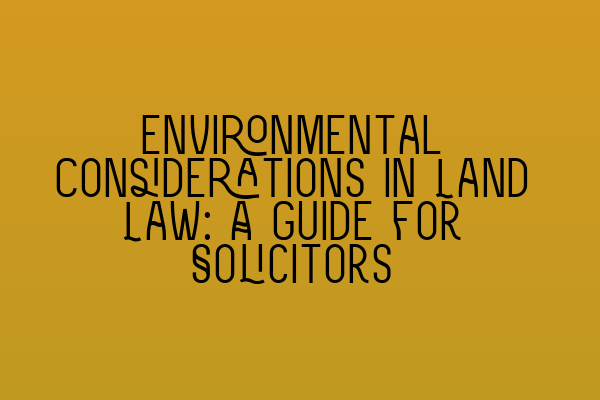Environmental considerations play a crucial role in land law matters. As a solicitor, it is important to be well-versed in the environmental aspects of land law to effectively represent your clients’ interests. This guide aims to provide you with a comprehensive understanding of environmental considerations in land law and equip you with the knowledge you need to navigate this complex area.
What are Environmental Considerations in Land Law?
Environmental considerations in land law refer to the legal aspects associated with the impact of human activities on the environment and the regulations in place to mitigate such impacts. These considerations are essential in ensuring sustainable development, protecting natural resources, and minimizing harm to the environment.
When dealing with land law matters, solicitors must understand the environmental implications, obligations, and potential liabilities that may arise. This includes issues such as pollution, contamination, conservation, planning, and compliance with environmental regulations.
Environmental Assessments
One of the key aspects of environmental considerations in land law is conducting thorough environmental assessments. These assessments involve evaluating the potential environmental impact of a proposed development or land use, including any contamination risks.
As a solicitor, you need to advise your clients on the necessity of conducting environmental assessments and the implications they may have on their plans. It is crucial to ensure compliance with environmental regulations and to identify any potential liabilities that may arise from environmental issues.
Environmental assessments typically involve site inspections, investigations, and analysis of environmental data. The findings of these assessments inform decision-making processes, such as planning applications or property transactions. It is essential to work with environmental consultants and experts to conduct these assessments effectively.
Environmental Regulations
Understanding the relevant environmental regulations is vital in land law matters. There are numerous national and international regulations that govern environmental considerations, including:
- The Environmental Protection Act 1990
- The Water Resources Act 1991
- The Conservation of Habitats and Species Regulations 2017
- The Town and Country Planning (Environmental Impact Assessment) Regulations 2017
As a solicitor, you must have a comprehensive understanding of these regulations and how they apply to your clients’ specific situations. Compliance with these regulations is essential to avoid potential legal issues and environmental liabilities.
Liabilities and Remedies
Environmental considerations in land law may give rise to liabilities and obligations for landowners. This can include liability for contamination, damage to protected habitats, or breaches of environmental regulations.
As a solicitor, it is crucial to advise clients on potential liabilities and help them devise strategies to mitigate these risks. This may involve negotiating appropriate indemnities, conducting due diligence, or assisting with environmental remediation efforts.
When environmental issues arise, it is also essential to explore potential remedies for affected parties. This may involve seeking compensation, injunctions, or working towards environmental restoration or remediation.
Collaboration and Expertise
Environmental considerations in land law often require collaboration with various experts, including environmental consultants, ecologists, and surveyors. Working in partnership with these professionals is essential to ensure thorough assessments and accurate advice.
It is important to establish a network of trusted environmental experts who can provide the necessary expertise for your clients’ specific needs. This collaborative approach helps to ensure comprehensive and accurate advice in environmental matters.
Conclusion
Environmental considerations are a critical aspect of land law. As a solicitor, it is crucial to have a comprehensive understanding of environmental regulations, conduct thorough environmental assessments, and advise clients on potential liabilities and remedies. Collaborating with environmental experts is essential to provide accurate and informed advice.
If you are preparing for the SQE exams and want to practice your knowledge of land law and property law, we recommend checking out our related articles:
- SQE 1 Practice Exam Questions
- SQE 1 Practice Mocks FLK1 FLK2
- SQE 2 Preparation Courses
- SQE 1 Preparation Courses
- SRA SQE Exam Dates
These resources will help you enhance your understanding of property law and land law, and prepare you for success in your SQE exams.
